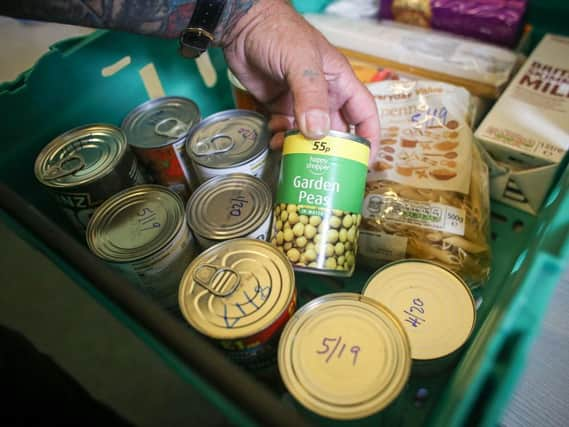'No-one should go hungry in 2020'


Prior to the pandemic, food poverty was already a serious
issue in the UK with 8 million adults going hungry due to the impact of a decade of austerity measures, insecure wages and a punitive welfare system.
Since lockdown, that number has increased by 3 million. It has exposed the holes in our safety net to support people, which has rendered many exceptionally vulnerable.
Advertisement
Hide AdAdvertisement
Hide AdMore citizens and families are struggling to make ends meet because of the Covid-19 outbreak due to job loss, loss of earnings and not being able to cover the costs of bills, food and rent.
It therefore made no sense whatsoever for the Government, in this climate, to want to cancel free school meals during school holidays.
In fact, it took the threat of a legal challenge by the Good Law Project and one footballer, Marcus Rashford, to intervene on behalf of 1.3 million children who risked going hungry over the summer holidays. The Government did a U-turn and this has no doubt lessened the financial burden for many low income families.
Food banks and social support networks have been quick to respond to the rising demand for food aid provision and here in Northamptonshire the Covid-19 community resilience cell, a multi-agency partnership of local government and civil society groups responding to the pandemic, have reported 13,770 local residents signing up to volunteer.
Advertisement
Hide AdAdvertisement
Hide AdThis has meant being able to help out 29,867 vulnerable people shielding during the first 100 days of lockdown. You can follow updates on the amazing local response here in the county on social media, using the hashtag #NorthantsTogether.
This week, a new report ‘Hungry for change: fixing the failures in food’, was published by the House of Lords Food, Poverty, Health and Environment Committee and it serves as an urgent wake up call for the Government.
As part of its recommendations relating to tackling food poverty, it calls on the Government to commit to detailed and routine monitoring of food insecurity; reform Universal Credit; increase the cost of Healthy Start vouchers; increase the Free School Meal allowance; more resources to combat school holiday hunger; and to support vulnerable people who have no recourse to public funds.
In relation to the last recommendation, it was alarming to hear Prime Minister Boris Johnson, during this public health crisis, not understand what no recourse to public funds (NRPF) meant when an MP highlighted the case of a family in this situation of not being able to access financial support during Covid-19. Being aware of your own political policies is the minimum requirement of any MP, let alone Prime Minister.
Advertisement
Hide AdAdvertisement
Hide AdPost Covid-19, there is a real opportunity for renewal and rebuilding a society where people within our communities are guaranteed their human dignity during difficult times, no matter what their stage of life or what state of national emergency we find ourselves in.
We also need to stop paying lip service to key workers and provide wages that are a living wage.
The existence and prevalence of food poverty in the sixth richest country in the world is a massive failure of political policy and one any government should be ashamed of, especially when you are a Government which claims that work is the route out of poverty.
Explain that fact to working families who are having to access a food bank because of low pay and zero hour contracts.
Advertisement
Hide AdAdvertisement
Hide AdPeople living in poverty isn’t an inevitability. It’s a political choice and one with far reaching and damaging consequences.
No one should have to go to bed hungry, to school hungry, to work hungry or even be hungry.
This isn’t really a radical ‘ask’, instead it’s about embedding a sense of common decency and humanity within economic and social policy.
And that should be the minimum requirement of any civilised society.